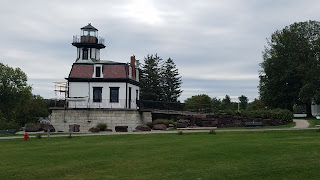My spouse and I visited the Shelburne Museum on a Sunday
afternoon in late September 2018. The museum is open daily from 10:00 am until
5:00 pm. Adult admission costs $25 in season and $10 out of season (fall and
winter) because not all structures are open year-round; ideally, you should
visit this museum from May 1 to October 31. Discounts are available, including
for AAA, teenagers, children, and Vermont residents; in addition, some local
hotels provide coupons (disappointingly, the Hilton Garden Inn Downtown
Burlington where we stayed did not). A museum shop with quality gifts, a cafe,
restroom facilities, and an exhibition and learning center are onsite. For those
with mobility challenges, a small shuttle transports guests from location to
location.
The museum opened in 1952 to showcase the collections of
founder Electra Havemeyer Webb, including folk art, fine art, decorative arts,
textiles, and architecture. The museum campus covers 45 acres and includes 39
historic buildings (25 of which illustrate
historic New England architecture) that house the collections and 20
gardens that create a beautiful landscape. Some of the most notable buildings
are the Ticonderoga (a 1906 220-foot steamboat), the Round Barn, 1890 railway
station with a 1914 steam locomotive and 1890 private rail car (which wasn’t
open the day we visited), 19th-century covered bridge with two lanes and a
footpath, 1840 one-room schoolhouse, lighthouse, 1890 slate jail, and a 1840 general
store. The museum’s Electra Havemeyer
Webb Memorial Building contains six period rooms relocated from the Webb
family’s 1930s New York apartment at 740 Park Avenue that showcase art by
Monet, Manet, Degas, Cassatt, and Wyeth. On certain days, craftspeople
showcase the trades of blacksmithing, printing, spinning, and weaving.
The collections we liked most were centered on the circus
(including 50 restored carousel animals, 600 posters, a hard-carved 3500-piece
miniature circus, and a 112-piece circus parade in a specially designed
525-foot U-shaped building), 1400 waterfowl decoys, dolls and dollhouses (over
1,000 dolls made of wax, wood, cloth, china, bisque, and papier mache, 27
dollhouses, and 1,200 doll accessories), toys, and 225 horse-drawn carriages
(including sleighs, stagecoaches, and commercial wagons displayed in the 1901
round barn and elsewhere).
You can also visit nearby Shelburne Farms, the former estate
of Webb’s in-laws that today offers accommodations, dining, and tours.
We enjoyed our visit to this interesting non-traditional
indoor-outdoor museum. (Some guests compare the Shelburne Museum to a
smaller-scale version of Henry Ford’s Greenfield Village in Michigan, and
having visited that site in July 2017, we can see some similarities.)

























No comments:
Post a Comment